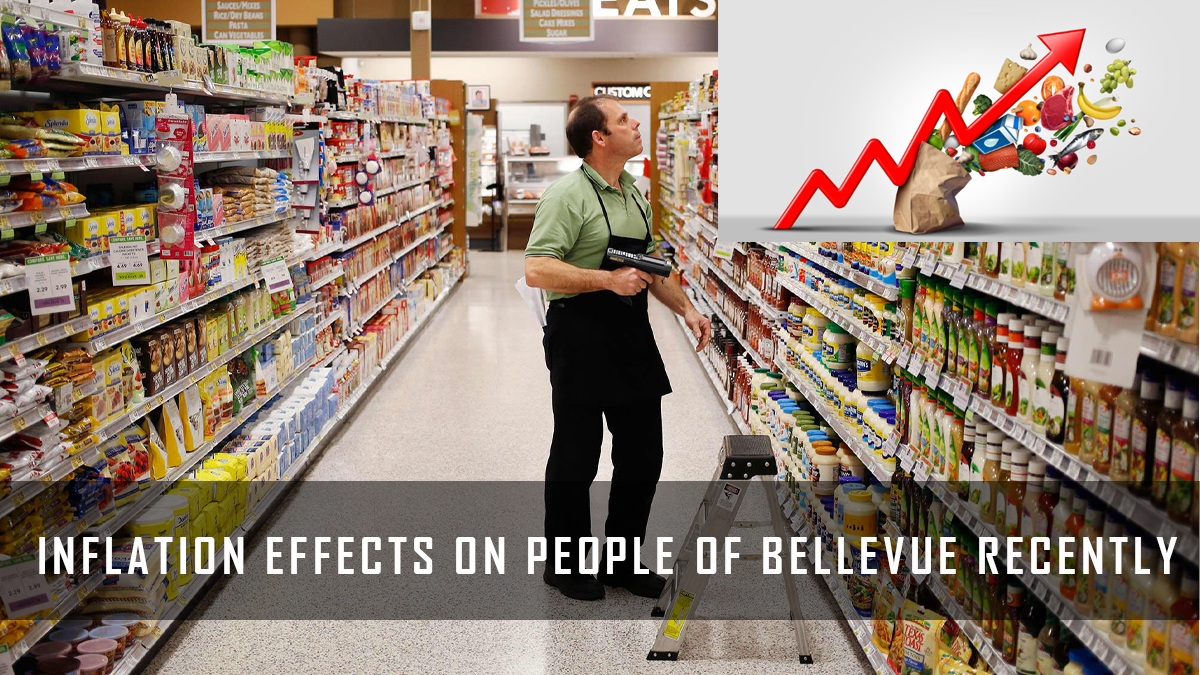With the current inflation rates, the people of Bellevue are feeling the pinch. The article goes over how the prices of certain goods and services have skyrocketed in recent months and what can be done to make life a little more comfortable.
Inflation is when the money supply in a country increases at a faster rate than the overall consumer prices. If inflation were to continue at its present rates, the prices of everything will have to go up by double digits.
The National Bureau of Economics claims that consumer inflation will average about 4% for the next five years. The chart just above shows their forecast for consumer prices, which is currently sitting at 5%.
Inflation rates in the 1970s were as high as 11%. In 1980, it was 10%, and there was a 10% inflation rate in the year 2000. Overall, economists predict that there will be a 5% increase in inflation by 2011.
Inflation has already affected the grocery store workers of Bellevue. A bottle of milk has gone up $5 in just a few months, and chicken breasts have increased across the board. Overall, a typical family will be looking at several dollars more on their grocery bills every month.
Since you can’t buy food without money, people begin to lose interest in that particular item. The prices of all things tend to go up and it’s no surprise that people are growing weary of the current prices.
The National Bureau of Economics has predicted that the price of oil will increase by 5% over the next five years and they are on target with that forecast.
The Importance of Inflation
Inflation has a direct and significant impact on people’s lives, especially those who live in Bellevue. The inflation rate is the rate at which the prices of goods and services rise. It is measured as the percentage change in the Consumer Price Index (CPI).
The main effects of inflation are:
Rising prices:
Inflation means that prices for goods and services go up over time. This makes it harder for people to afford things.
Reduced purchasing power:
As prices go up, each dollar you have buys less than it did before. This is called “reduced purchasing power.”
Higher interest rates:
When inflation is high, interest rates usually go up as well. This makes it more expensive to borrow money.
Uncertainty:
High inflation can lead to economic uncertainty. This can make people worried about their future and make them less likely to spend or invest money.
Business cycles:
High inflation makes the economy more volatile. It can lead to business cycle expansions and contractions.
Imbalance between inflation and growth:
If a country’s inflation is higher than its growth rate, this is considered bad for the country’s development. For example, the Chinese government has been trying to push down their rising rate of consumer price inflation by increasing interest rates for several months, which causes some economic problems for China’s industries.
Poverty:
High inflation makes it harder for poor families to afford basic needs (food, clothing, medicine, and education). It especially affects low-income families.
What Causes this?
There are various factors that contribute to inflation. The most common cause of this is an increase in the money supply. When the money supply grows too quickly, it can lead to inflation. Other factors that can cause this include increases in production costs, decreases in the supply of goods and services, and increases in taxes and government spending.
Inflation can have both positive and negative effects on people. For example, if wages don’t keep up with this, people may have a harder time making ends meet. On the other hand, if people have savings, they may see the value of their savings decrease as the cost of living goes up. Inflation can also lead to higher interest rates, which can make it more difficult to borrow money.
How Does This Affect People?
Inflation is defined as the increase in the prices of goods and services in an economy. The main cause of inflation is the increase in the money supply. When there is more money chasing after fewer goods, prices go up.

Inflation affects people in different ways. Those on fixed incomes, such as retirees, may find that their purchasing power decreases as prices go up. Those with variable incomes may find that their income does not keep pace with this.
Inflation can also have different effects on different groups of people. For example, this may hurt savers because the interest rates on their savings accounts may not keep pace with this. On the other hand, borrowers may benefit from this because they will be able to repay their loans with cheaper dollars.
Overall, this can be a burden for many people, particularly those on fixed incomes or with low incomes. It is important to remember that inflation is a normal part of an economy and generally occurs when an economy is growing.
How is Bellevue Affected by this?
Inflation is an increase in the overall prices of goods and services in an economy. It affects people in Bellevue because the cost of living goes up when this occurs. This can make it difficult for people to afford basic necessities like food and housing. In addition, this can lead to higher interest rates, which can make it more difficult for people to get loans or credit. Ultimately, this can have a negative effect on the standard of living for people in Bellevue.
Inflation is typically measured either by the consumer price index (CPI) or the producer price index (PPI). The CPI is used to determine a cost of living adjustment for Social Security payments. Alternatively, the PPI measures changes in costs at the wholesale level. Generally, this hurts Bellevue because prices increase, which means city revenue from property and sales tax will decrease – thereby forcing higher taxes on Bellevue residents.
The Bureau of Labor Statistics (BLS) reports that this has risen nearly 5 percent since 2008. The U.S. Department of Labor reported that the CPI rose 0.4 percent in the month of May 2016 compared to a year earlier. Over the past 12 months, the CPI has risen 2 percent, which is above the Federal Reserve’s target inflation rate of 2 percent a year.
Conclusion
There’s no doubt that inflation has had an effect on people in Bellevue recently. Prices for basic necessities have gone up, and wages haven’t kept pace. This has put a lot of financial pressure on families in the area.
But it’s not all doom and gloom – there are some silver linings to this cloud. People are becoming more resourceful, and local businesses are working hard to keep prices down. There is a sense of community spirit in Bellevue at the moment, as people help each other through this tough time.
This may be causing some problems in Bellevue at the moment, but the community is coming together to face it head-on.

